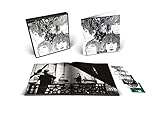Son Volt, let by Jay Farrar, tackle many of the issues of our current era with the new album, Union. The result is an admirable attempt to aim high and create important music with something to say.

One hears echos of past activists and the tradition of folk music’s commentary on the times. Clearly, Farrar was trying to connect with that history. The band recorded three of the album’s songs at the Mother Jones Museum in Illinois and recorded four songs at the Woody Guthrie Center in Oklahoma.
Sometimes the earnestness and the weight of trying to connect to Mary Harris (“Mother Jones”) and Guthrie seem to burden the music, with direct lyrics that do not leave much to the imagination. But the band’s playing is great, and Farrar’s voice is in great form. The often-changing cast of the band here includes Mark Spencer, Andrew DuPlantis, Chris Frame, and Mark Patterson. So even lyrics that seem too obvious — “Ninety-nine percent / It’s a trickle-down world” — still come in catchy songs that stick in your head. Other songs like “Lady Liberty” and “While Rome Burns” also land direct punches.
Connecting the Personal to the Universal
The songs that work best connect to personal moments or make you think in ways you may not have thought before. For example, the title track “Union,” recounts Farrar’s father’s belief about the need for something to bind the country together: “He said national service/ Will keep the union together.” Of course, many presidents have shared a similar belief, from Franklin D. Roosevelt to more recent presidents like George W. Bush and Barack Obama.
One of the more powerful songs on the album is “Reality Winner.” A listener may be excused if after an initial listen the chorus makes the person think the song is about the reality TV star as president (“What have you done, Reality Winner?”). But the song tells the story of an Air Force veteran named Reality Winner. She is now in prison for being a whistleblower to let Americans know the Russians affected the 2016 election. While not as epic as Bob Dylan’s “Hurricane,” another song about a prisoner, one may hope that the song helps draw more attention to Winner, who was sentenced to more than five years in prison.
Similarly, “The Symbol” uses a personal tale to make a larger point. Farrar sings in the voice of an undocumented immigrant who has been in the U.S. for ten years and had children in the country. Even though he helped rebuild New Orleans, the immigrant now hears people calling him a criminal.
Not every song is about politics. “Devil May Care” is about a barroom band. Farrar has noted he included the song as sort of a respite from some of the heavier themes on the album. Other less political songs include “Holding Your Own” and “The Reason.”
The band also took an old song and made it new. Activist Joe Hill wrote the lyrics to “Rebel Girl,” and the words were published in the early 1900s in the Little Red Songbook by the Industrial Workers of the World. Farrar added music to Hill’s words. In doing so, he created a wonderful merger of meaningful heartfelt lyrics with beautiful music, forming an instant classic, again connecting something personal and individual to something larger.
That’s the rebel girl, that’s the rebel girl;
To the working class she’s a precious pearl;
She brings courage and pride to the fighting rebel boy;
I will fight for freedom with a rebel girl.
Conclusion
So, what to make of this album that has received mixed reviews ranging fromAmerican Songwriter hearing an “emotionless approach and . . . muted instrumentation” to American Highways finding “new political depth” in the album? Union is far from perfect, but there are near perfect moments. It is difficult for an artist to take on modern political issues while society is still working out those issues and their meaning. But here is a noble attempt. And we should all appreciate that Jay Farrar and Son Volt are using good music to try to tell us something.
What is your favorite song on Union? Leave your two cents in the comments.

